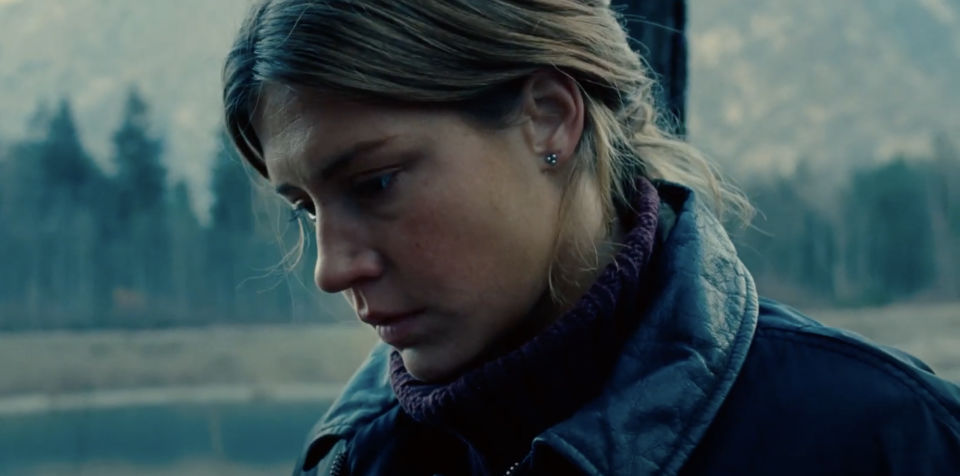‘The Five Devils’ Review: Adèle Exarchopoulos Is Alight in This Elemental Queer Love Story

- Oops!Something went wrong.Please try again later.

Every Cannes Film Festival, there is a quest to find the most iconic needle-drop moment from films playing across every strand. The 2022 gold medal is Léa Mysius’s to lose for her deployment of Bonnie Tyler’s 80s power ballad “Total Eclipse of the Heart.” The song is cued up at a karaoke night in a sleepy French village, selected by Joanne (Adèle Exarchopoulos) for her and Julia (Swala Emati) to perform. Julia has the distinction of being both Joanne’s long-lost, high-school love, and the sister of the man she ended up marrying. When Julia suddenly returns, after years of self-exile, theirs is not the easiest path back to each other. In their corner, helping out, is the snarling, roaring force of this raw anthem. Emat, a professional singer, and Exarchopoulos, an actress who puts her body into everything she does, grow in confidence as the song builds to its ragged crescendo.
At home afterward, Jimmy (Moustapha Mbengue), sarcastically compliments his wife on the show and points out that anyone who witnessed it would know what it symbolized. Joana explodes. It has been suggested by her needling father that she and Jimmy are not having sex. The lack of passion in her life, contrasted with the touch-paper lit by Julia’s return, cause her to lose all composure, yelling at Jimmy, until he pushes her out of the room.
More from IndieWire
. Jimmy is a fireman; Joanna a lifeguard at a local pool. The opening sequence is a striking statement of intent, as cinematographer and co-writer Paul Guilhaume films the girls in sparkling gymnast costumes from behind as they watch a fire crackle against the pitch black of night. One of the girls turns around — it’s Adèle Exarchopoulos. Cut to the next scene of Joanne leading a class of water aerobics to a pool of senior citizens. Beside her, leading the class from a much shorter vantage point, is her daughter, Vicky (Sally Dramé), grinning with happiness at being close to her beloved mother. Their next point of call is the local lake. Vicky helps to coat Joanne’s body in a layer of milking grease to protect her from the freezing water. It’s a ritual the two share every day. For Joanne, it’s an act of sensual extremity, at odds with the humdrum routine of her daily life.
Mysius has made a film in thrall to the body, often doggedly following Exarchopoulos, as Abdellatif Kechiche did in “Blue is the Warmest Color,” but with more restraint. When Joanne chops vegetables, the camera watches from behind, capturing the way muscles tense and move in the place where the neck meets the back. Even if she doesn’t feel alive, the film seems to say, she looks it. This is a perspective Mysius affords all her actors, as she and Guilhaume focus on finding individual grace, irrespective of what the characters are going through, or how they feel. Like her countrymen, Claire Denis, who famously shoots actors like she’s in love with them, a clear benevolence shrouds all inhabitants of “The Five Devils.”

Mubi/screenshot
When the camera is not with Joanne, it’s with young Vicky, a kid with unusual talents. Mysius’s gorgeous debut, “Ava” (which premiered in Cannes Critics Week 2017) told the story of a 13-year-old girl going blind amid attendant growing pains and desires. This interest in sight evolves to the point of magical realism. Vicky has visions that turn out to be episodes from her mother’s past. She also has a preternatural sense of smell and gathers different specimens with distinct aromas in labeled glass jars. These heightened powers of sight and smells are at odds with her social status. Born to a white mother and a black father, she is subject to racist bullying at school, an environment in which she is very much isolated, strengthening the ferocity of her attachment to Joanne.
Across both “Ava” and “The Five Devils” Mysius attributes great mystery to girlhood, locating it as a source of losses and strengths that defy conventional understanding. Unlike Stephen King’s Carrie White, whose telekinetic powers were activated by the desire for revenge against cruel peers, Vicky is ambivalent about her bullies and focused on the domestic space where she is free to make potions in the backyard. Mysius is less interested in spinning a neat and tidy story than delivering a cinema that is pregnant with inexplicable sensations. The camera drinks in every location, from the banal and domestic to the crisp majesty of the great outdoors — the lake is surrounded by an Alpine forest.
Vicky’s visions lead to fragmentary flashbacks of Joanne’s past. She is someone who never left the place where she grew up, so we see the same locations at different times. In the present, certain images — like Joanne driving Vicky to school — are repeated. These repetitions build up a restless rhythm, as we wait for something to change, like waves rushing against a sea wall over and over, until they break through and transform the landscape forever.
Character motivations are not depicted as rational or logical, but impulsive. Joanne is sleepwalking until she is woken up by the urge to love again. She is mirrored by the small village, a place that works like clockwork, until Julia, everyone’s catalyst, returns and the gossip and anger ignite. Daphne Patakia from “Benedetta” has a small part as a colleague of Joanne’s with burns across her face and body. She brings the same feral energy that made Sister Bartolomea so magnetic, this time fueled by rage and grief.
Some viewers may be frustrated by the opaque way all threads are resolved. To the end, Mysius retains the sense of her film being a glistening and mysterious object, you can watch but can’t touch. Yet this intact mystery flows from themes too vast to ever be rendered fully transparent: young girls are prescient and love is fate. As Tyler sang, “Every now and then I get a little bit restless and I dream of something wild.”
Grade: A-
“The Five Devils” premiered in Cannes Directors’ Fortnight. It will be distributed by Mubi.
Best of IndieWire
A History of Unsimulated Sex Scenes in Cannes Films, from 'Mektoub' to 'Antichrist'
New Movies: Release Calendar for May 27, Plus Where to Watch the Latest Films
20 Controversial Film and TV Book Adaptations That Rankled Their Audiences and Authors
Sign up for Indiewire's Newsletter. For the latest news, follow us on Facebook, Twitter, and Instagram.

